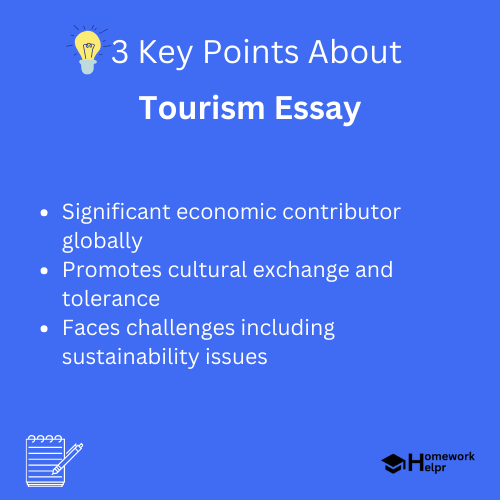📝 Summary
Tourism is the act of traveling to different places for recreation or leisure, significantly contributing to the economy of numerous countries. It promotes cultural exchange, creates job opportunities, and enhances infrastructure. However, tourism can also lead to overcrowding and environmental issues. As technology advances, the tourism industry evolves, focusing on sustainability and personalized experiences. The future of tourism emphasizes eco-friendly practices and the importance of responsible travel, allowing individuals to explore diverse cultures and landscapes while preserving the planet’s resources. Enjoy your adventures!
Tourism: An Introduction
Tourism is the act of traveling to different places for recreation, business, or leisure. It is a vital industry that contributes significantly to the economy of many countries around the world. Tourists explore various destinations, experience diverse cultures, and enjoy various activities. Overall, tourism allows people to broaden their horizons and enjoy their lives to the fullest.
The Importance of Tourism
Tourism holds a significant place in the global economy. It is one of the major sources of income for many countries and helps in creating numerous job opportunities. The importance of tourism can be outlined as follows:
- Economic Growth: Countries that attract tourists see increased revenues from taxes, business operations, and services supporting tourism.
- Cultural Exchange: Tourism facilitates interactions among different cultures, allowing visitors to appreciate traditions and lifestyles other than their own.
- Infrastructure Development: Tourism encourages improvement in local infrastructure such as roads, airports, and public transportation.
- Employment Opportunities: The tourism sector creates jobs – from hotel staff to tour guides – contributing to the development of local communities.
Definition
Infrastructure: The physical structures and facilities needed for the operation of a society, such as roads, bridges, and buildings. Cultural Exchange: The sharing of ideas, traditions, and values between different cultures.
Types of Tourism
Tourism can be classified into various types based on the purpose and style of travel. Here are some prominent types:
- Adventure Tourism: Involves activities like hiking, scuba diving, or climbing, appealing to thrill-seekers.
- Cultural Tourism: Focused on exploring historical sites, museums, and local traditions.
- Ecotourism: Emphasizes responsible travel in natural areas, aiming to conserve the environment.
- Medical Tourism: Traveling to other countries for medical treatments and services.
Examples
For instance, if you love hiking and enjoy nature, adventure tourism through the Grand Canyon is perfect for you. On the other hand, if you’re curious about ancient civilizations, cultural tourism in Egypt might intrigue you with its pyramids and museums.
Impact of Tourism on Local Communities
Tourism has a profound impact on local communities. While it can bring economic benefits, traffic, and crowding are some negative aspects. It is crucial to understand both positives and negatives:
- Positive Impacts: Increased revenue, preservation of local culture, improved public facilities.
- Negative Impacts: Overcrowding, environmental degradation, dilution of local traditions.
❓Did You Know?
Did you know that Disneyland, which opened in California in 1955, attracts more than 18 million visitors annually? It is considered one of the most popular tourist destinations in the world!
Challenges in the Tourism Industry
Despite its significance, the tourism industry faces several challenges, including:
- Natural Disasters: Earthquakes, floods, or hurricanes can severely damage tourist destinations.
- Pandemics: Diseases like COVID-19 lead to travel restrictions, affecting tourism numbers dramatically.
- Environmental Sustainability: The impact of tourism on nature can lead to habitat destruction and pollution if not managed properly.
Definition
Sustainability: Meeting the needs of the present without compromising the ability of future generations to meet their own needs.
Tourism and Technology
With the advancement of technology, tourism has transformed remarkably. Today, technology aids in various aspects of tourism:
- Travel Planning: Numerous online platforms allow travelers to research and book flights and accommodations instantly.
- Virtual Tours: Many museums and historical sites offer virtual experiences for those unable to travel.
- Mobile Applications: Travel apps help in navigation, translations, and providing information about local attractions.
Examples
For example, if you’re planning a trip to Europe, you can use travel planning apps to compare flight prices, book hotels, and even find the best restaurants around you.
The Future of Tourism
The future of tourism will focus on sustainability and responding to global trends like climate change and shifting consumer behaviors. Sustainable tourism aims to protect natural and cultural resources while providing economic benefits to local communities.
Additionally, as we embrace changes brought by technology, we might see a rise in:
- Eco-Friendly Travel: Tourism that minimizes the environmental impact of travel.
- Personalized Experiences: Customized travel packages based on individual preferences using data analytics.
- Remote Travel: Flexibility allowing people to work from desirable locations while enjoying the tourism experience.
Definition
Data Analytics: The science of analyzing raw data to make conclusions about that information.
Conclusion
In summary, tourism is a multifaceted industry that significantly influences economies, cultures, and communities worldwide. It opens the door to new experiences, promotes cultural exchange, and supports local economies. However, it is essential to address the challenges it brings, such as environmental concerns and potential cultural dilution. By embracing sustainability and technological advancements, the future of tourism can be bright and beneficial for everyone involved.
So, whether you’re looking to explore historical landmarks, indulge in local cuisine, or seek adventure, the world of tourism offers endless possibilities! Travel responsibly and enjoy discovering everything our beautiful planet has to offer.

Related Questions on Tourism Essay for Students and Children
What is tourism?
Answer: Traveling to different places for various purposes.
Why is tourism important?
Answer: It boosts economies and creates job opportunities.
What are the types of tourism?
Answer: Adventure, cultural, ecotourism, and medical tourism.
How does technology help tourism?
Answer: It aids in planning, navigation, and virtual experiences.
